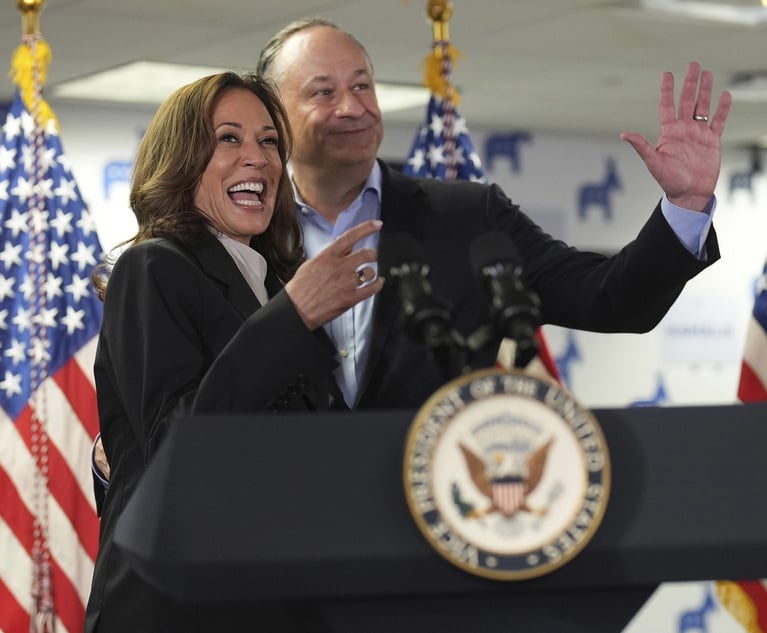 Neil Gorsuch testifies before the Senate Judiciary Committee in 2017. Credit: Diego M. Radzinschi / NLJ
Neil Gorsuch testifies before the Senate Judiciary Committee in 2017. Credit: Diego M. Radzinschi / NLJFrom Law Prof to SCOTUS Clerk: Gorsuch Is Hiring From Academia
U.S. Supreme Court law clerks often become professors after their clerkships, but not usually before.
May 22, 2019 at 10:53 AM
4 minute read
In his two-plus years on the U.S. Supreme Court, Justice Neil Gorsuch has earned a reputation as someone who did not always follow court traditions or norms when it came to his oddly written opinions or his snippy questions at oral argument.
The law clerks he has chosen also display his outside-the-box approach, most notably Tobi Young, the first-ever enrolled citizen of an American Indian tribe to clerk at the high court. She is clerking with him this term. Among the 12 clerks Gorsuch has hired since joining the court in April 2017, two are Asian-American, two are women, and one has Hispanic roots.
Now comes a new Gorsuch trend in clerk hiring: In upcoming terms, at least three of his law clerks will be drawn from the ranks of legal academia, not the most common source of Supreme Court clerk talent. Clerks often become professors after their clerkships, but not usually before.
Here are the new hires, first identified in a tweet by Pepperdine University School of Law professor Derek Muller, a keen Supreme Court-watcher:
>> Stephen Yelderman, a professor since 2013 at the University of Notre Dame Law School, will move this summer to Gorsuch's chambers for the 2019-2020 term. Yelderman clerked for then-Tenth Circuit Judge Gorsuch in 2010. “I really enjoyed working for then-Judge Gorsuch, and am very excited for the opportunity to work with him again,” he said in a statement.
>> Mark Storslee, executive director of Stanford Law School's Constitutional Law Center since 2016, confirmed that after teaching at Pennsylvania State University School of Law for the next academic year, he will clerk for Gorsuch in the 2020-2021 term. He told NLJ, “I am very excited for this opportunity and I look forward to assisting the justice and the court in their important work.”
>> Stephanie Barclay, associate professor at Brigham Young University Law School, will clerk for Gorsuch in the 2021-2022 term. She joined the faculty after litigating First Amendment cases at the Becket Fund for Religious Liberty, and working as an associate at Covington & Burling. “I am excited and humbled that Justice Gorsuch would give me this opportunity, and I am indebted to many mentors and colleagues who helped me along this path,” she said in a press announcement.
Do law professors make good law clerks? Pepperdine's Muller backs that idea. “Law professors bring greater experience than those a year or two removed from law school, and they're accustomed to deep research on high salience legal topics,” he said.
Jamil Jaffer, who was head of the new National Security Institute at the Antonin Scalia Law School before clerking for Gorsuch in 2017, said, “He is not looking for law professors, but for lawyers with a combination of both academic excellence and experience.”
So it's not a surprise that Gorsuch would pick at least some law professors to join his clerk mix. “He wants a good conversation in his chambers, different points of view,” Jaffer said in an interview. “It's not just diversity for diversity's sake, but people with a broad range of backgrounds and histories absolutely generates the kind of dialogue that's important to him.”
Asked whether law professors would make Gorsuch's criticized writing style better or worse, Jaffer stated adamantly, “Not a word comes out of his chambers that is not his. Like it or criticize it, it's him.”
Read more:
This content has been archived. It is available through our partners, LexisNexis® and Bloomberg Law.
To view this content, please continue to their sites.
Not a Lexis Subscriber?
Subscribe Now
Not a Bloomberg Law Subscriber?
Subscribe Now
NOT FOR REPRINT
© 2024 ALM Global, LLC, All Rights Reserved. Request academic re-use from www.copyright.com. All other uses, submit a request to [email protected]. For more information visit Asset & Logo Licensing.
You Might Like
View All
'As I've Grown Older': John Morgan Looks Back at a Life in Law

The 'Biden Effect' on Senior Attorneys: Should I Stay or Should I Go?
9 minute read
2024 GC Pay Report: Signing Bonuses Swell in Size as Companies Shy Away From Internal Hires
7 minute readTrending Stories
- 1Judge Denies Sean Combs Third Bail Bid, Citing Community Safety
- 2Republican FTC Commissioner: 'The Time for Rulemaking by the Biden-Harris FTC Is Over'
- 3NY Appellate Panel Cites Student's Disciplinary History While Sending Negligence Claim Against School District to Trial
- 4A Meta DIG and Its Nvidia Implications
- 5Deception or Coercion? California Supreme Court Grants Review in Jailhouse Confession Case
Who Got The Work
Michael G. Bongiorno, Andrew Scott Dulberg and Elizabeth E. Driscoll from Wilmer Cutler Pickering Hale and Dorr have stepped in to represent Symbotic Inc., an A.I.-enabled technology platform that focuses on increasing supply chain efficiency, and other defendants in a pending shareholder derivative lawsuit. The case, filed Oct. 2 in Massachusetts District Court by the Brown Law Firm on behalf of Stephen Austen, accuses certain officers and directors of misleading investors in regard to Symbotic's potential for margin growth by failing to disclose that the company was not equipped to timely deploy its systems or manage expenses through project delays. The case, assigned to U.S. District Judge Nathaniel M. Gorton, is 1:24-cv-12522, Austen v. Cohen et al.
Who Got The Work
Edmund Polubinski and Marie Killmond of Davis Polk & Wardwell have entered appearances for data platform software development company MongoDB and other defendants in a pending shareholder derivative lawsuit. The action, filed Oct. 7 in New York Southern District Court by the Brown Law Firm, accuses the company's directors and/or officers of falsely expressing confidence in the company’s restructuring of its sales incentive plan and downplaying the severity of decreases in its upfront commitments. The case is 1:24-cv-07594, Roy v. Ittycheria et al.
Who Got The Work
Amy O. Bruchs and Kurt F. Ellison of Michael Best & Friedrich have entered appearances for Epic Systems Corp. in a pending employment discrimination lawsuit. The suit was filed Sept. 7 in Wisconsin Western District Court by Levine Eisberner LLC and Siri & Glimstad on behalf of a project manager who claims that he was wrongfully terminated after applying for a religious exemption to the defendant's COVID-19 vaccine mandate. The case, assigned to U.S. Magistrate Judge Anita Marie Boor, is 3:24-cv-00630, Secker, Nathan v. Epic Systems Corporation.
Who Got The Work
David X. Sullivan, Thomas J. Finn and Gregory A. Hall from McCarter & English have entered appearances for Sunrun Installation Services in a pending civil rights lawsuit. The complaint was filed Sept. 4 in Connecticut District Court by attorney Robert M. Berke on behalf of former employee George Edward Steins, who was arrested and charged with employing an unregistered home improvement salesperson. The complaint alleges that had Sunrun informed the Connecticut Department of Consumer Protection that the plaintiff's employment had ended in 2017 and that he no longer held Sunrun's home improvement contractor license, he would not have been hit with charges, which were dismissed in May 2024. The case, assigned to U.S. District Judge Jeffrey A. Meyer, is 3:24-cv-01423, Steins v. Sunrun, Inc. et al.
Who Got The Work
Greenberg Traurig shareholder Joshua L. Raskin has entered an appearance for boohoo.com UK Ltd. in a pending patent infringement lawsuit. The suit, filed Sept. 3 in Texas Eastern District Court by Rozier Hardt McDonough on behalf of Alto Dynamics, asserts five patents related to an online shopping platform. The case, assigned to U.S. District Judge Rodney Gilstrap, is 2:24-cv-00719, Alto Dynamics, LLC v. boohoo.com UK Limited.
Featured Firms
Law Offices of Gary Martin Hays & Associates, P.C.
(470) 294-1674
Law Offices of Mark E. Salomone
(857) 444-6468
Smith & Hassler
(713) 739-1250










